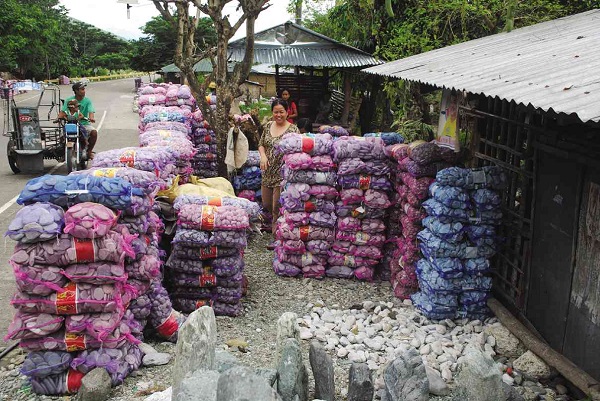River yields new source of villagers’ livelihood

SACKS of river stones are displayed and sold along the highway in Barangay Bagting in Gabaldon, Nueva Ecija. The colorful stones, washed down from the mountains by floodwater, have become a new source of income for Bagting residents. ANSELMO ROQUE / INQUIRER CENTRAL LUZON
GABALDON, Nueva Ecija—Residents of Barangay Bagting here have cast their lot in stones and have started earning.
Stones of various colors and shapes that they gather in a river here are sold along the highway fronting their houses. Many of their customers, mostly plant nursery operators, have been coming to Bagting to buy these in big volumes.
Residents of the village used to make their living by raising and selling vegetables. But in 2009, Typhoons “Ondoy” and “Pepeng” hit and destroyed their crops and property. The floodwater spawned by the typhoons’ heavy rain swelled the river in Barangay Bagting. Little did residents know that the floodwater was unraveling to them a comparatively lucrative source of income.
“It was my mother Imelda who noted the colorful stones in the river bed which were probably washed down from the mountain,” Joan Rafael, 20, said.
“She picked up some stones and brought them home. Then she said they could mean big business,” she added.
Rafael’s mother hired several boys to gather as many stones as they could and placed them in customized, colorful sacks similar to those used for bagging onions.
Buyers started noticing the roadside display of colorful stones and soon after, 25 other residents followed the lead of Rafael’s family and sold stones that they gathered in the village river.
On the day the Inquirer visited Barangay Bagting, 47 km east of Cabanatuan City, Rafael was recording the loading of 1,500 sacks of stones bought by a garden operator from Bulacan.
She said the buyer was paying her P50,000.
Every now and then, Rafael said small vehicles stop in their village to buy the bags of stones.
It helped that many travelers pass by on their way to popular resorts in this town and to the coastal town of Dingalan in Aurora province, about 12 km away.
The stones come in red, white, green, blue, brown (called “popcorn” and “cookies”) and orange. Some are labeled as “crystal” (pure white), “seven colors” (assorted), “cracked” (striped), “multicolor” and others.
The stones and pebbles sell for P30 to P35 a bag. Some who buy their stocks here reportedly resell them for at least P80 a sack.
Also sold in some roadside stalls in the village are rocks and boulders that sell from P5 to P250 a piece. Rafael, who is her mother’s assistant in the family business, said the business has also provided a source of income for stone gatherers and for those making the sacks.
She said stone gatherers are paid P10 a sack. If the stones are delivered by the gatherers, they are paid P14 a sack, she said. Rafael said her father and other men in the village have started stone carving using boulders and rocks found in the village’s river.